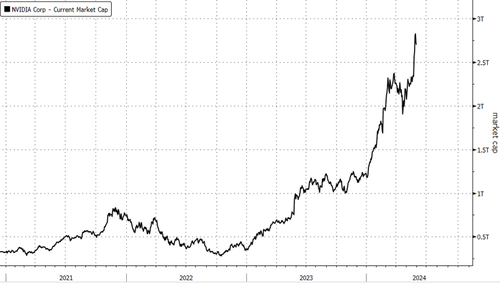At the 2024 Taipei International Information Technology Show, better known as Computex, Nvidia CEO Jensen Huang highlighted the endless possibilities surrounding artificial intelligence. He unveiled plans for new AI accelerator chips, signaling the company's shift from graphics cards to AI chips.
In March, Nvidia unveiled the $70,000 Blackwell B200 GPU chip, the "world's most powerful AI chip." On Sunday, Huang told the audience about the Rubin AI chip slated for 2026. He said the new chip would use HBM4, the next iteration of the essential high-bandwidth memory.
Huang stressed that companies that fail to embrace AI will be left behind. He said companies can only manage the "computation inflation" of ever-expanding data needs through AI chips.
Combining two processors on a personal computer is already standard practice for increasing computational power, but try this at a data center...
"We add a GPU, a $500 GPU, to a $1,000 PC, and the performance increases tremendously," he said, adding, "We do this in a data center. A billion-dollar data center, we add $500 million worth of GPUs, and all of a sudden, it becomes an AI factory."
"The more you buy, the more you save. This is the CEO's math. It is not accurate, but it is correct!" the executive told the audience.
Huang's new chip unveiling comes ahead of Monday's cash session in New York. The company's shares are inching closer to the $3 trillion valuation mark.
TechRadar's John Loeffler had a running blog during Computex, commenting on Huang's speech. One big takeaway from Loeffler is Nvidia's transformation from a graphics card company to an AI chip company.
They [Nvidia] are no longer a graphics company, as Jensen reportedly told employees several months back, and every Nvidia keynote and live stream I've watched in the last year and a half really just reinforces that fact.
Nvidia is absolutely, 100% going to become an AI chip company, and whatever gaming appendage sticks around for a few years will become less and less of a focus for the company.
There's nothing particularly wrong with that, to be honest. Nvidia is printing money hand over fist selling AI hardware to OpenAI, Google, and all the rest, so from a business perspective, it makes perfect sense. It'd be the height of madness not to position yourself at the center of an industry that's giving you 10x better returns than what you were doing before.
Its AI revenue, even if AMD and Intel eventually produce AI data center hardware that offers genuine competition to whatever Nvidia is producing down the road, is still going to dwarf whatever money its GeForce products bring in. GeForce might continue for some time, especially on mobile devices where RTX chips can be a way to interface with Nvidia's broader AI ecosystem, but I think in the end, the consumer graphics market is going to come down the AMD and Intel. I just don't see Nvidia's heart being in the consumer graphics game any longer.
Loeffler continued:
If it helps Nvidia sleep better at night to call what its making now GPUs, they're the ones with the $2 trillion valuation, they can do as they like. But there's a part of me, the life-long PC gamer part of me, that feels like Nvidia has decided that the PC gamers that initially propelled the company to success two decades ago don't really matter anymore.
Huang didn't offer many specifics on the new chip that will begin shipping in 2026. However, during an earnings call earlier this year, the exec said the chip giant will design new platforms annually, down from every two years.
